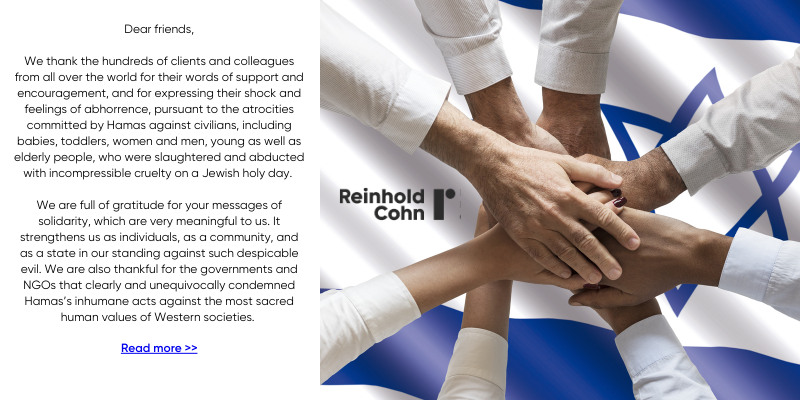Early Publication and Other Significant Revisions Introduced in an Amendment of the Israeli Patents Law

A recent Amendment of the Israeli Patents Law1 introduced some substantive changes to the Israeli patent regime. The most significant change is the introduction of early publication of an application. Other changes include provisions that concern advancement of examination; opening the door to submission of examination material by third parties; and right to compensation for infringement that occurs after the date of early publication of an application.
An Amendment (the “Amendment“) of the Israeli Patents Law (the “Law“) was passed by the Knesset (the Israeli Parliament) on July 9, 2012 and published on 12 July 2012, this being the effective date for most of the changes. The important changes introduced by the Amendment are discussed below.
Early Publication of a Patent Application
The Amendment introduces an early publication that did not previously exist in the Law. According to a new Section 16A a patent application and its file wrapper will be laid open to public inspection within a period of 18 months, calculated from the filing date; or, in case of a claimed convention priority, from the priority date. In the case of a national phase application of a PCT application, the file will be laid open within 45 days of the Israeli filing date of the application.
It should be noted that the Law continues to provide for very limited publication occurring shortly after filing. Such publication includes only limited bibliographic data on the application and does not divulge its contents. The application’s file wrapper remains sealed until the early, 18-month publication.
The newly introduced early publication will be made through listing the patent application in the Patent Office’s website and through provision of online access to the full contents of the file.
A Circular Letter of the Patent Registrar dated 25 July 2012 provided some clarifications of the practice to be adopted by the Patent Office in implementing this change. Among others, it was noted that at the beginning of each month the Patent Office will send out advance notices on the forthcoming publication to each applicant, whose application is to be published in the coming Patents & Designs Gazette (which issues at the end of each month). An applicant who wishes to withdraw his application prior to early publication may notify the Patent Office within 7 days of such notice.
Patent applications that were filed before the Amendment came into effect and where the 18-month period from the earliest priority date has already lapsed, will be published within 12 months from the date of the Amendment, in the order of precedence of their local filing dates, up to a maximum of 4,500 such cases each month.
Note: notwithstanding the introduction of an early publication and the ability of third parties to submit material for examination (see below), the Law still provides for a pre-grant opposition, as it existed before the Amendment. Following acceptance of an application, a notice thereof is published in the Official Gazette and there is then a 3-month period in which any interested party can oppose the grant of the patent. The patent will be granted if no opposition is lodged within said 3-month term or, if lodged, if and when it is eventually dismissed.
Submission of Material by Third Party
According to a new Section 18(b)(3) an examiner may consider in his examination also publications submitted by third parties. It seems that according to the language of this new Section the Examiner may not be obliged to consider the material submitted by a third party2; although it stands to reason that such material will be considered. Also, according to the language of the Amendment, third parties are restricted to submitting publications only.
The non-extendible time limit for submitting such material is two months from applicant’s submission of a response to the Patent Office’s requirement under Section 18 of the Law3.
Advancement of Examination
New Section 19A was added that defines the requirements and procedure for advancing examination that was previously prescribed only through Regulations. Moreover, and highly important, this new Section also allows a third party to petition for advancement of examination. This latter option is an entirely new concept provided under the law and probably without much precedent in patent laws of other countries.
Once a special, advanced examination status is granted upon petition of the applicant, any request for extension will bring to immediate cessation of this special status. However, where the special status is granted following a petition by a third party, unless it can be shown that the delay occurred under circumstances over which the applicant or his attorney had no control or which could not have been prevented, no extension of term will be available. This means that not meeting a specific term during prosecution may lead to nullification of an application!
There are several grounds for advancement of examination. There is an overlap between the grounds available for an applicant petitioner and a third party petitioner, these including: unreasonable delay in the onset of examination, public good considerations, as well as, generally, special circumstances that would justify it4 Other grounds available to an applicant petitioner include: advanced age or medical condition of the applicant, examination results in other countries, under conditions and circumstances prescribed by the Registrar (e.g. under the Patent Prosecution Highway) and actual or suspected unauthorized exploitation of the invention by a third party. A specific ground available to a third party petitioner includes a potential postponement of a development program of such third party.
Compensation for Infringement as of the Date of Early Publication
Section 179 of the Law has been revised by the addition of a new sub-Section 179(1) that permits the court to award compensation in the case of infringement of a patent as of the date of early publication and the date of publication of acceptance of the application5 Note that even in the case of a national phase of a PCT application, it is only the date of early publication of the Israeli application that triggers potential compensation in case of infringement of the patent to be eventually granted, not the publication date of the PCT application.
The compensation will be on the basis of reasonable royalties that the infringer would have paid had he received a license to exploit the invention. Such compensation will be awarded only if the invention claimed in the patent application is substantially the same as that in the eventually issued patent.
Effective Date
All revisions in the Amendment other than the new advancement of examination provisions are with immediate effect. The new provisions for advancement of examination will come into effect within 6 months from publication of the Amendment, i.e. on 12 January 2013.
1 Patents Law (Amendment No. 10), 5772-2012 (passed by the Knesset, the Israeli Parliament, on 9 July 2012).
2 Section 18(b)(3) reads: “The Examiner may consider documents specified in sections (a)(1) to (4), even if submitted to him by a person other than the applicant, …“
3 The Section 18 requirement is to submit a list and copies of publications that includes references cited by other examining authorities as well as references known to applicant that may be relevant to patentability.
4 This a very general and broad ground and it remains to be seen how this general ground will be interpreted by the Patent Office or the courts
5 The ability of the Court to award full compensation in the case of a patent infringement retroactively as of the date of publication of acceptance was already prescribed in Section 179, before the Amendment, and this provision remains as is (now as sub-Section 179(2)).
This article is provided for general information only. It is not intended as legal advice or opinion and cannot be relied upon as such. Advice on specific matters may be provided by our group’s attorneys.
